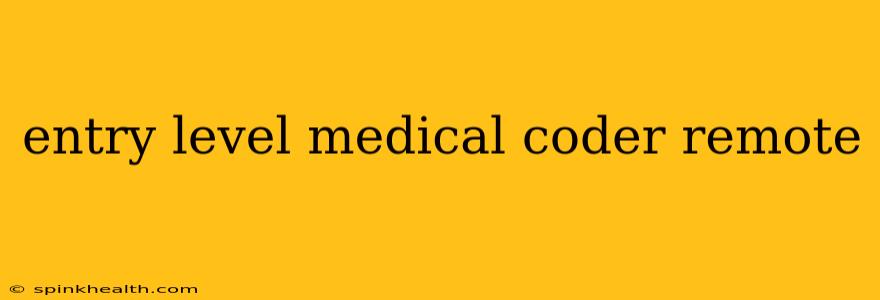Cracking the Code: Your Remote Journey into Entry-Level Medical Coding
The hum of the computer, the quiet click of the keyboard – this could be the soundtrack to your new career. The world of remote medical coding is booming, offering a flexible, rewarding path into the healthcare industry, even at the entry level. But like any career path, it has its challenges and its unique rewards. Let’s unravel the mystery of becoming a remote entry-level medical coder, answering some burning questions along the way.
What is Medical Coding?
Imagine being a translator, bridging the gap between the language of doctors and the language of insurance companies. That’s essentially what a medical coder does. We take complex medical records – doctor’s notes, lab results, diagnostic images – and transform them into standardized alphanumeric codes. These codes are the key to insurance claims processing, ensuring healthcare providers get reimbursed for their services. It's a crucial role in the healthcare system, and one that's increasingly in demand.
How Can I Become a Remote Entry-Level Medical Coder?
This is where the adventure begins! Your journey starts with education and certification. While a college degree isn't always mandatory, a robust understanding of medical terminology, anatomy, physiology, and the intricacies of the coding systems (like ICD-10 and CPT) is paramount. Many online programs offer comprehensive training, often culminating in certifications that can significantly boost your job prospects. Look for programs accredited by organizations like AHIMA (American Health Information Management Association) for added credibility.
What are the Required Skills for a Remote Medical Coder?
Beyond the technical skills, soft skills are equally crucial for success in a remote environment. A keen eye for detail is essential – even a small error in coding can lead to delays or claim denials. Strong analytical abilities are needed to interpret complex medical information accurately. Excellent communication skills are a must, both written and verbal, for collaborating with colleagues and potentially clarifying ambiguities in medical records. Finally, self-discipline and time management skills are vital for maintaining productivity and meeting deadlines while working remotely.
What are the Common Medical Coding Certifications?
Several certifications can significantly enhance your employability. The Certified Professional Coder (CPC) credential offered by the AAPC (American Academy of Professional Coders) is widely recognized and highly sought after. AHIMA offers several certifications, including the Registered Health Information Technician (RHIT) and Registered Health Information Administrator (RHIA), which are also valuable assets. Research the specific requirements and choose a certification that aligns with your career goals.
How Much Can I Earn as an Entry-Level Remote Medical Coder?
Salaries vary based on experience, location, and certification. However, entry-level remote medical coders can expect a competitive starting salary, with potential for growth as you gain experience and specialized skills. Online resources and job boards offer insights into current salary ranges in your region.
What are the Challenges of Working as a Remote Medical Coder?
While the flexibility is alluring, working remotely also presents certain challenges. Maintaining focus and discipline in a home environment requires self-motivation and strong time management skills. Effective communication with colleagues and supervisors is crucial, as face-to-face interactions are limited. Isolation can also be a concern, so it's essential to cultivate a network of colleagues and actively engage in professional development activities.
Where Can I Find Remote Medical Coding Jobs?
Several job boards and websites specialize in remote work opportunities. Leverage your network – connect with professionals in the field through online forums and professional organizations. Company websites of healthcare providers and medical billing companies often post remote coding openings. Be patient and persistent – your ideal remote medical coding opportunity is out there!
The journey to becoming a remote entry-level medical coder isn't without its hurdles, but the potential rewards – a fulfilling career, flexibility, and the satisfaction of contributing to the healthcare system – make it a truly worthwhile pursuit. So, crack open those textbooks, sharpen your skills, and embark on your exciting new adventure!

